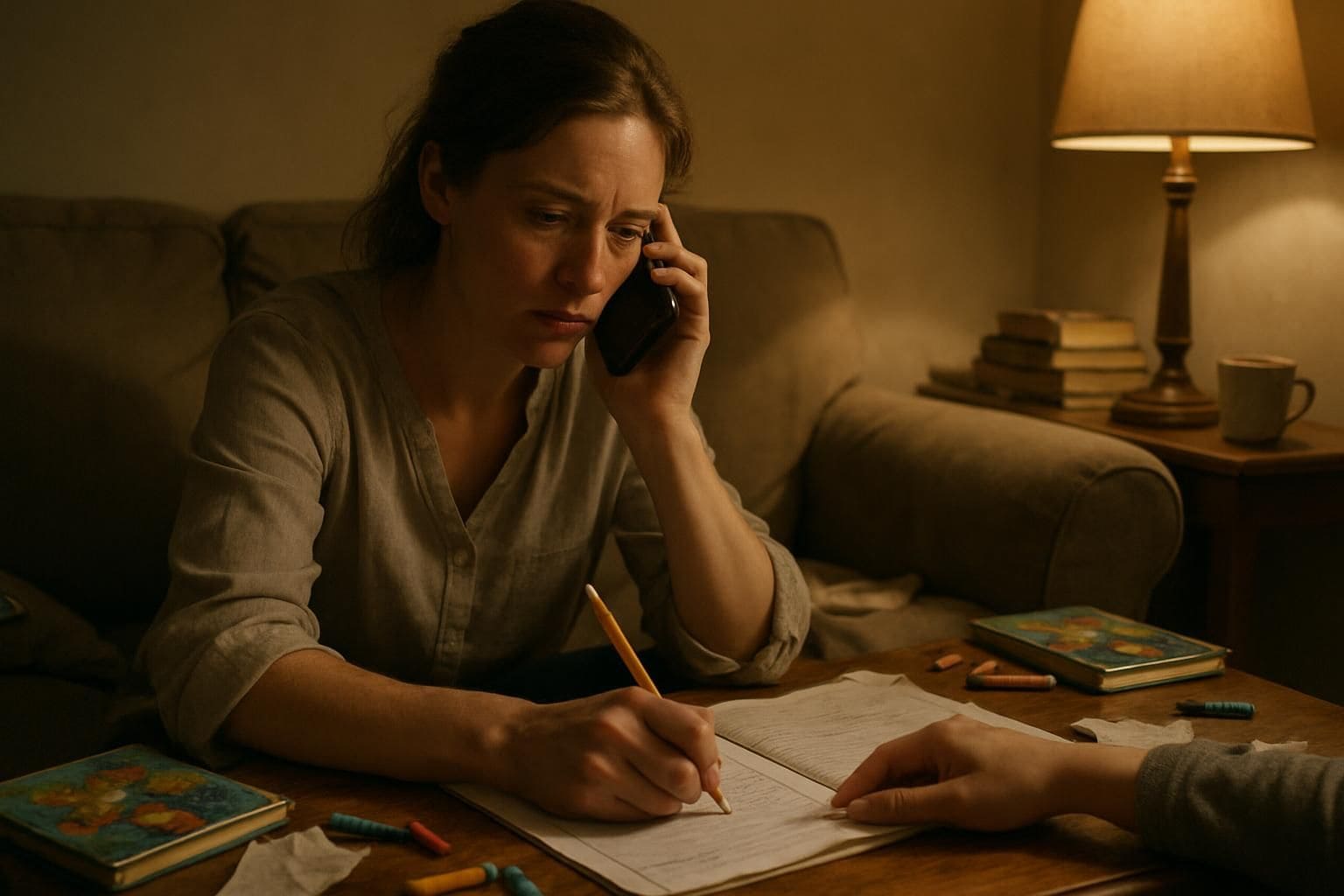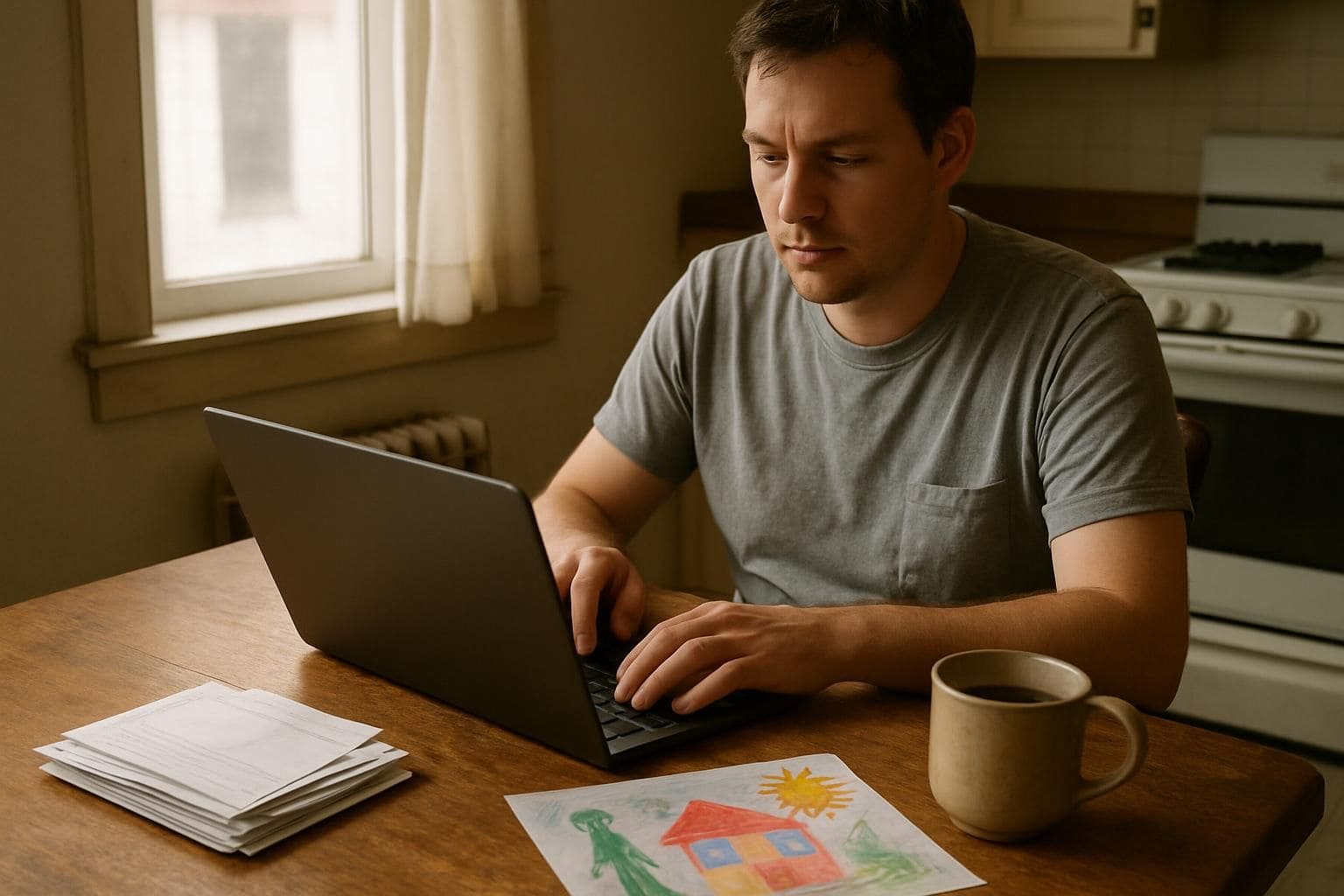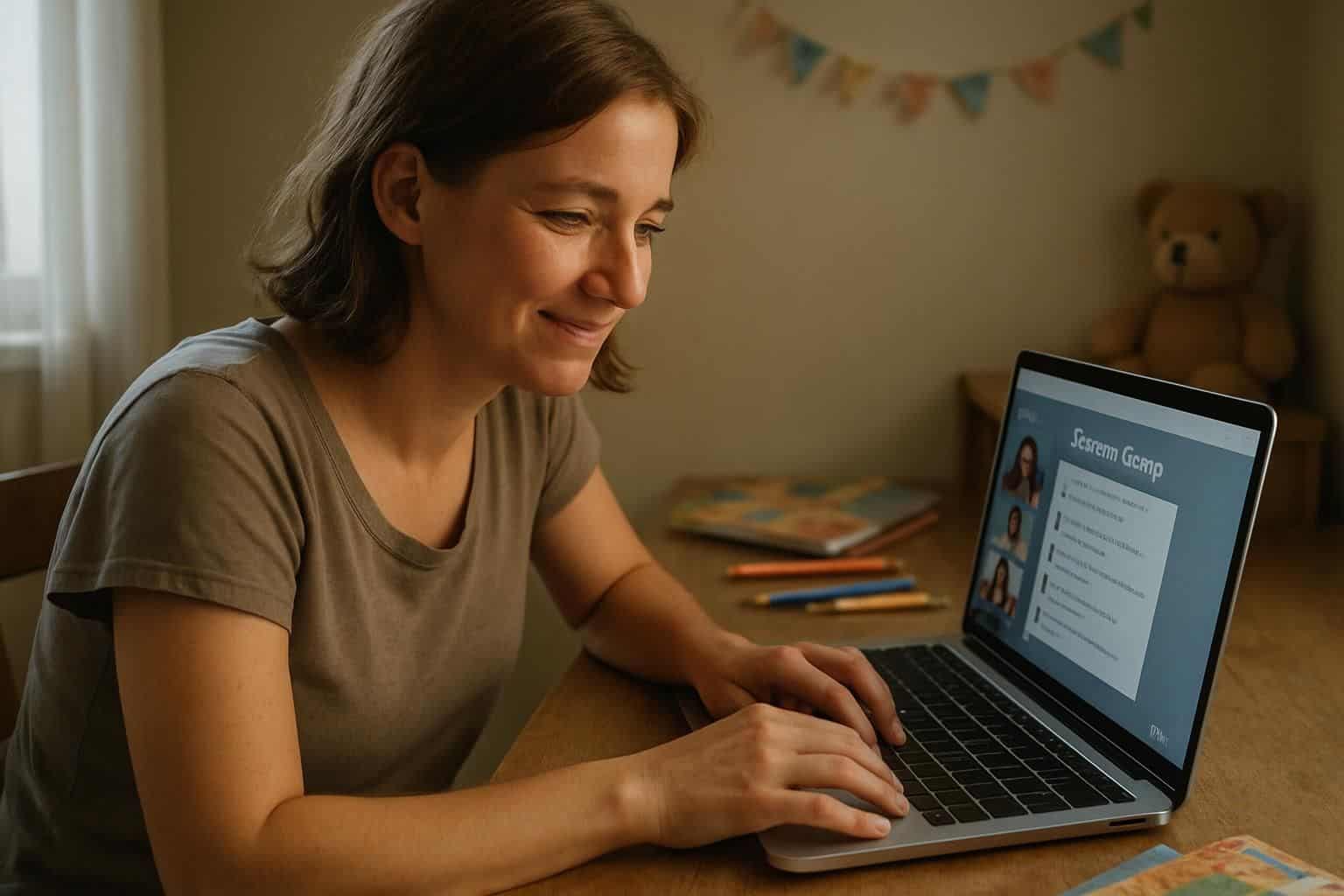Solo parenting can feel stressful, lonely, and exhausting—especially when managing all the parenting responsibilities alone. The United States has more single-parent homes than any other country in the world.
This blog will share seven practical solo parenting tips to lower your stress level, build emotional support networks, and help you thrive as a parent. You don’t have to do this alone!
Key Takeaways
Solo parents manage childcare duties entirely on their own—no co-parent to split responsibilities or provide financial support, unlike single parents who might share custody or expenses with an ex-partner.
Many solo parents struggle financially, with nearly 19 million children in the U.S. growing up in single-parent families dependent on a single income to cover living costs.
Studies indicate single parents experience depression at rates roughly double (2.02 times greater) compared to parents with partners—making self-care, emotional support, and reliable connections especially vital.
Kids raised by a solo parent often build deeper relationships with that parent, become independent sooner, and gain valuable life skills such as problem-solving and resilience.
Helpful solo parenting tips include building a solid support network, sticking to regular daily routines, making time for yourself, clearly defining rules and limits, and reaching out to professional services whenever necessary.
Table of Contents
Understanding Solo Parenting

Solo parenting brings unique joys and hurdles that differ from single parenting in key ways. Parents who handle most tasks alone need clear facts about what makes their path special.
Definition of Solo Parenting

Solo parenting involves raising children alone without a partner to help out. These parents handle full custody and cover all expenses for their kids, with no spouse or live-in partner to share the load.
Many mothers in this role experience stress, yet also a strong sense of pride and accomplishment. Paths toward solo parenting vary greatly—some become solo parents after a divorce, others choose adoption, and still others decide they’re ready to be a single mom through sperm donation.
The strength of a solo parent isn’t about the weight they carry, but about the way they carry it.
This style of parenting differs from single parenting in several important ways. Single parents often split custody or receive financial support from another parent living separately.
Solo parents, on the other hand, manage everything alone—from daycare runs and homework assignments to budgeting and household financial choices. This reality creates unique difficulties, especially around managing time efficiently and supporting emotional well-being.
We’ll explore these points in detail soon.
Solo Parenting vs. Single Parenting: Key Differences

The terms “solo parent” and “single parent” often get mixed up, but they represent different parenting situations with unique challenges and dynamics. Let’s break down the key differences between these two paths.
| Solo Parenting | Single Parenting |
|---|---|
| Parents choose to have and raise children without a partner | Parents may share custody and financial duties with an ex-partner |
| Full financial responsibility falls on one person | May receive child support or shared expenses with ex-partner |
| No backup for sick days, emergencies, or daily tasks | Possible relief during other parent’s custody time |
| Complete decision-making authority | Often requires co-parent agreement on major decisions |
| Children might develop higher anxiety from having one caregiver | Kids can benefit from two separate support systems |
| Higher emotional burden due to lack of parenting partner | Emotional load may be shared between two households |
| No need to manage complex co-parent relationships | Requires ongoing communication with ex-partner |
| Children may take on grown-up responsibilities earlier | Responsibilities can be distributed between households |
My friend Janet became a solo parent through adoption five years ago. She tells me the hardest part isn’t the practical challenges but explaining to people that she didn’t “become single” after having her daughter. She planned her family this way from the start. The freedom to make all parenting choices herself brings both stress and satisfaction. Her story shows how solo parents face different social and emotional hurdles than parents who split after having children together.
Common Challenges of Solo Parenting

Solo parents face tough hurdles that can drain them daily. Money worries, time crunches, and mental health strain can pile up fast when you’re the only adult in charge.
Financial Struggles
 Money struggles hit single parents especially hard. Around 19 million kids live in single-parent households, where one paycheck handles every expense. Most single parents juggle tough decisions about needs versus extras.
Money struggles hit single parents especially hard. Around 19 million kids live in single-parent households, where one paycheck handles every expense. Most single parents juggle tough decisions about needs versus extras.
Setting a clear budget, using real numbers, helps manage tight finances and keeps debt problems at bay. For many single moms, the final days of each month bring anxiety and stress about money shortages.
One way to ease that worry is to save up an emergency fund—at least $1,000—to soften unexpected bills. A cash cushion helps prevent sudden costs from derailing your budget, easing your mind and building confidence.
It can also reduce stress levels significantly, especially when compared with situations like co-parenting as a single mom.
Government assistance programs offer some relief if you qualify—but the red tape, forms, and delays can often add frustration. Wise single parents ease financial pressures by seeking no-cost family activities, joining local free-exchange communities, or working from home to better balance their parenting and professional tasks.
Time Management Issues

Solo parenting comes with daily struggles against the clock. You’re juggling job duties, household chores, and kid care—all without a helping hand. Many moms tell me stress kicks in as tasks pile up, leaving no space to catch a breath.
The key lies in planning your day well and sorting your tasks by priority. I learned that lesson the tough way, after missing my son’s school play due to poor inbox management. Smart parents often reserve chunks of time—for work, family events, and personal downtime—to prevent burnout.
Taking moments for yourself isn’t selfish; it helps you stay steady and strong for your kids. Weekend meal prep is another useful trick, saving valuable minutes on busy weekdays. I prepare multiple meals every Sunday now, freeing my evenings to help with homework.
This simple switch cut my stress levels by half and boosted my mood dramatically. Many divorced moms from my support group use similar strategies—to create small pauses in their stuffed schedules.
Emotional and Mental Health Challenges

Single parenting can seriously challenge mental health, disrupting daily routines and emotional balance. Research indicates single parents face higher depression risks—about 2.02 times greater than those with partners.
It’s more than just numbers…it’s feeling overwhelmed by parenting alone, without emotional support or shared responsibilities. Many single mothers experience intense feelings of sadness and grief, making everyday tasks feel exhausting and demanding.
Constantly juggling household responsibilities, work duties, and dual parenting roles creates an ideal environment for emotional burnout.
Mental health struggles also impact kids in single-parent households. Children of parents experiencing depression or anxiety often face difficulties in school and develop emotional issues themselves.
Single moms, in particular, report elevated anxiety levels compared with mothers in partnered relationships. Finding effective emotional coping strategies is essential to protect both parent and child health.
Unfortunately, feelings of shame or lack of available time prevent many single parents from reaching out for professional help. This reluctance can worsen existing challenges, making the burden even tougher to manage.
Developing connections with family, friends, or local support groups can significantly ease emotional pressures—offering a pathway to relief. For more insight, check out this guide on single mom challenges.
Limited Support Network
Solo parenting often means having a pretty thin safety net. For many single moms, it’s a daily struggle just finding reliable help—for childcare or even basic tasks. I’ve lived this reality myself, and it isn’t easy.
Without backup support, simple errands often become complicated missions. Maybe your kid suddenly gets sick on a busy workday, or you badly need a break to recharge—but there’s no one around to call on short notice.
This constant pressure impacts both mental well-being and your available single mom childcare choices.
Having clear nanny contracts in place is essential once you find dependable childcare help. With a simple agreement, everyone clearly understands what’s expected—protecting both your family and the caregiver.
The strongest people are not those who show strength in front of us, but those who win battles we know nothing about.
Rewards of Solo Parenting

Solo parenting brings many rewards beyond the daily grind – from deeper connections with your kids to becoming more tough and capable as you face challenges head-on… read on to discover how this unique family setup can help your children grow into strong, self-reliant people who understand the value of teamwork and love.
Stronger Parent-Child Bond
Single parents often form deeper connections with their kids through focused daily time together. Research has found these special bonds can lead to lasting benefits for children well into adulthood.
The one-on-one attention gives room for open conversations, genuine moments, and honest sharing—moments that busier families sometimes miss. In fact, many single mothers notice their children talk more freely during quiet bedtime chats or on drives around town.
This close relationship also helps children build confidence. Studies show teenagers raised by single moms often grow up with stronger self-esteem than their friends. The concentrated attention between parent and child offers reassurance—they know someone’s truly listening and seeing them clearly.
This emotional closeness acts like a protective shield, helping kids handle social interactions with greater ease, resilience, and comfort.
Personal Growth and Resilience
Solo parenting pushes your limits in ways you never imagined. Overnight, I found myself fixing dripping faucets, handling the bills alone, and picking up countless new skills. This journey builds inner strength, spilling into every part of your life.
Many moms uncover hidden talents and newfound confidence along the way. Daily tasks and unexpected hurdles force you to think creatively and adapt fast.
The strongest people aren’t those who show strength in front of us, but those who win battles we know nothing about.
Patience and perseverance grow naturally through this experience. Your kids see you face struggles and overcome them, learning their own coping skills by your example. Studies indicate children raised by solo parents often become strong problem solvers after watching their parent directly handle life’s ups and downs.
Solo parenting sometimes feels exhausting—no doubt—but each obstacle conquered boosts resilience for both you and your children, lasting well into the future.
Teaching Independence and Responsibility to Children
Raising kids alone can make you stronger—and that strength naturally passes down to your children. By teaching them independence early, you offer skills they’ll rely on forever.
Children often learn best by dealing with the outcomes of their own decisions. So, set clear rules about chores, homework, and respectful behavior, helping them see exactly what’s expected.
Open conversations build trust, giving your kids room to express themselves openly. This strategy proves effective even if you’re raising a child born outside marriage or through sperm donation.
Small tasks help your child build self-confidence. Begin with easy, age-appropriate jobs—like tidying toys or straightening beds. These simple chores teach kids their actions have value and gradually boost their academic progress, too.
As kids manage more tasks on their own, your parenting stress naturally decreases.
Tips for Thriving as a Solo Parent

Solo parents need simple tools to make daily life work. These tips will help you find balance and joy while raising kids on your own.
Build a Support System
Handling parenting alone… it just can’t be done without help. I figured this out quickly after juggling my job, household chores, and kids by myself for months. Creating connections with others seriously saved my sanity.
You need people who can pick your kid up from school if there’s an emergency at work, or someone to watch them while you’re at a job interview. Having a solid support group greatly cuts down stress and helps protect you from burnout.
Lots of parents ease their stress by joining local parenting circles to swap childcare duties. Others find comfort in online groups, connecting with moms and dads facing similar issues and trading tips.
Your village might not look traditional, but it’s still your village.
Support doesn’t always mean leaning on family. Friends, neighbors, coworkers, and fellow parents from your child’s school can become amazing allies. Local resources like childcare subsidies can also help reduce financial burdens if you’re working remotely.
Parenting classes can teach useful discipline methods and build up your confidence. Studies show kids even perform better academically when their parents have reliable support networks.
Even sperm donors and unmarried parents can find thriving online groups that offer emotional encouragement and practical parenting ideas.
Practice Self-Care
Self-care isn’t selfish—it’s necessary for your peace of mind as a single parent. I learned this the hard way after burning out from always putting my kids first. Even small actions can greatly improve your mental health.
Enjoy your coffee hot, taking five minutes just for yourself. Order takeout instead of making dinner on stressful days. Try curbside grocery pickups to reduce time and hassle. Your kids deserve you feeling energized, not frazzled and worn thin.
Self-compassion matters greatly on tough days. Allow yourself lower standards now and then—cookies for dinner occasionally won’t hurt anyone. Online, you can find plenty of quick self-care ideas that easily fit into hectic schedules.
If you work from home, spend your lunch break walking or meditating. The link how to self care as a mom provides even more practical tips for daily life.
Your strength as a parent grows each time you take care of yourself first.
Create a Routine and Set Boundaries
A simple daily routine brings calm to solo parenting chaos. My days became much simpler after I began setting clear times for work, rest, and play. Kids feel secure knowing what’s coming next, and parents enjoy extra breathing room.
Using a quick checklist each morning or prepping ahead at night can free up hours weekly. You can even post a visual schedule at home, somewhere easy for everyone to spot.
Clear limits protect your energy as a single parent. Learning to say “no” to draining extra tasks made all the difference for me. Children also gain comfort from clear rules for bedtime, screen use, and household behavior.
Predictable routines help kids feel protected and teach them respect. These boundaries extend into your work too—like setting aside family hours free from emails and calls. The toughest but most important part is asking for support whenever you truly need it.
Seek Professional Help When Needed
Having clear routines helps you manage daily tasks, but sometimes extra support is necessary. For single parents going through challenging periods, professional guidance can be a real lifeline.
Counseling sessions provide emotional strength and practical tools to handle daily stressors. Though it can feel lonely raising children alone, therapists assist in building fresh connections and lasting networks.
Therapy doesn’t have to be just for emergencies—it also offers opportunities for personal growth. Talking openly with a counselor can even help balance your job duties with parenting obligations.
Single parents working from home often find therapy greatly reduces stress and boosts overall coping skills. With proper emotional support for yourself, your child’s school performance might even get better.
Having professional social support can significantly increase resilience and confidence in parenting. Reaching out early, before stress gets overwhelming, can truly change your parenting experience for the better.
Navigating Co-Parenting or Non-Integrated Parenting

Co-parenting after a split takes clear rules and open talks to keep kids feeling safe and loved – read on for proven ways to make shared custody work even when you’re stressed.
Effective Communication Strategies
Open communication between parents truly matters for your child’s well-being. Honest, calm conversations create a stable environment for kids stuck in the middle. Even in tense moments, always speak respectfully.
Place your child’s needs ahead of past disagreements. Many single parents prefer texts over calls for making plans—it’s less stressful and provides proof of the conversations.
Work closely with your co-parent to tackle challenges as a team. A shared effort builds trust and helps your child feel secure. Set regular times to discuss school, health, and activities.
Keep a shared online calendar with important dates and notes. If discussions become tense, pause and revisit the talk later. Some parents find working with a mediator helps them communicate clearly and calmly.
Your child observes how you handle interactions—acting respectfully sets an example for their future relationships.
Maintaining Consistency for the Child
Once you’ve established clear ways to talk with your co-parent, your next job is helping your child feel stable and secure. Kids need routine—they really thrive on it—so keep meals, bedtimes, and daily activities consistent across both households.
A child feels safer, calmer, and more in control with this kind of predictability, especially during tough family transitions. Creating a shared family calendar showed my daughter exactly what was happening each day, easing her anxiety about change and uncertainty.
Your child benefits greatly by having a strong relationship with both parents. Never criticize or speak negatively about your co-parent in front of your child—this simple rule spared my family plenty of unnecessary tension.
If you’re frustrated or annoyed with your ex, you might find it helpful to read I Am Happy Now, So Why Do I Miss My Ex? | BetterHelp and then reach out privately to a friend, family member, or therapist instead. Kids who feel secure at home usually continue performing well academically, regardless of whether their parents married or if you work from home a few days each week.
Stability at home helps kids feel safer—especially during times filled with change.
Support Resources for Solo Parents

Solo parents can find help through online groups, local meetups, and money aid programs that offer both practical tips and emotional backing during tough times – click below to explore these lifelines that can turn your solo journey from survival mode to thriving success.
Online Communities and Social Media Groups
Finding your community makes parenting alone much easier. The Solo Parent App helps you connect with others who face similar daily hurdles. Last year, I joined three Facebook groups and got helpful tips on remote work options while raising my daughter.
These online communities become lifesavers at odd hours—like at 2 AM, when sleep escapes you and you need quick parenting advice. Many online groups cater to specific needs, such as raising kids after divorce or having children outside marriage.
Social media sites have lively groups for single parents who need practical tips or emotional encouragement. Members often post inspiring stories of overcoming parenthood struggles, which helped get me through some rough moments.
One mother shared how she handled job interviews despite caring for her sick child—her story gave me strength during my own job hunt. These online friendships sometimes spill into real life, bringing playdates and lasting connections for both you and your kid.
Financial assistance programs also exist to help single parents in need, providing an extra bit of support to ease everyday challenges.
Local Support Groups and Counseling Services
Local support groups give solo parents a much-needed lifeline from isolation. Through programs like the Solo Parent initiative, parents can connect with others who truly understand their daily challenges.
They swap parenting tips, share personal stories, and form genuine friendships. I joined one last year and finally found people who understood my struggles balancing work and family life.
These groups usually meet every week, either online or at local community centers—making attendance easy, even with busy schedules.
Professional counseling also offers expert advice to tackle specific parenting issues. Many therapists now provide flexible payment options, like sliding scale fees, or accept insurance coverage to keep costs manageable.
The Solo Parent subscription sends out regular updates about free workshops focused on helpful topics like managing stress, handling child behaviors, and planning finances. Using these services has improved my ability to manage parenting stress and even boosted my child’s grades at school.
In group therapy sessions, parents can openly discuss sensitive topics like intimacy or child-rearing concerns they often face alone.
Financial Assistance Programs
Financial support is available for single parents who need extra help. Programs such as TANF, SNAP, CCAP, and Head Start provide real relief when expenses become overwhelming. Last year, while working from home, I applied for SNAP—and it greatly eased our monthly grocery costs.
Another lifeline is the Federal Pell Grant, which helps parents boost their education and career prospects. These grants can cover schooling costs along with child care fees. Many moms aren’t aware of these options, particularly those raising children born outside marriage or conceived through artificial insemination.
Applying can take some effort—but it truly pays off. Your nearest family services office can walk you through the process and explain which programs match your income and situation.
How Will Solo Parenting Evolve in 2025?

Solo parenting will look different by 2025. Remote work will become more common, giving single parents extra time at home with their kids—while still earning a paycheck. Many employers now recognize that parents who work remotely often deliver excellent results.
This change makes life easier for moms juggling their job duties and parenting tasks, without stressful daily commutes. Technology will also offer better tools for solo parents, helping them keep track of their children’s progress at school and connect easily with online support communities.
Fresh apps and digital groups built specifically for solo parents will link those raising kids alone or separately from a co-parent. These online tools can boost parental strength by offering helpful tips, emotional backing, and friendship.
Single moms will more easily swap parenting solutions, celebrate milestones together, and ease the loneliness that sometimes creeps into their parenting experience. The future for solo parents is promising—with growing resources available, they will have what they need to flourish instead of barely getting by.
People Also Ask
What are the main struggles single parents face?
Solo parents often juggle several tough responsibilities at once. Finding enough hours each day becomes a constant battle. Money worries can add stress, since there is just one income covering all bills. They also have to manage all childcare tasks alone—schoolwork, doctor visits, cooking meals, bedtime routines—you name it. Building inner strength is key, especially because every decision about your child’s education and daily care falls squarely on your shoulders.
How can single parents help kids succeed at school?
Stay involved in homework and school activities regularly. Check in with teachers now and then to understand any needs your kid may have. Free online tools can be useful for boosting learning and improving skills at home. Create a calm, comfortable study area in your house—this helps your child focus better and learn effectively.
Does having unmarried parents impact child growth negatively?
Kids born to unmarried parents can do just as well as others—family shape doesn’t matter as much as parenting style. What really counts is having love, stability, and consistent care. Providing strong support and a nurturing home makes the biggest difference in your child’s healthy growth and emotional well-being.
How can solo parents grow stronger in tough times?
Take short breaks whenever possible; even a quick rest can help you recharge. Reach out to single parents who understand your situation—sharing experiences can ease stress and loneliness. Let yourself celebrate small victories each day. Be kind to yourself, and don’t expect perfection, as this helps build emotional strength over time.
References
https://mentalhealthcenterkids.com/blogs/articles/solo-parenting-vs-single-parenting
https://www.care.com/c/solo-parenting-vs-single-parenting/
https://thecompletedivorce.com/single-vs-solo-parenting-difference/
https://weekplan.net/top-9-time-management-tips-for-single-parents (2024-07-22)
https://pmc.ncbi.nlm.nih.gov/articles/PMC11231931/
https://www.homeaglow.com/hub/content/solo-parenting
https://danieldashnawcouplestherapy.com/blog/solo-parenting
https://www.youtube.com/watch?v=JGr9LFD77Nc
https://www.rootandriseblog.com/18-effective-solo-parenting-tips-to-really-help-you-survive/
https://wheremotherhoodmatters.com/navigating-solo-parenting/
https://www.kaydahealth.ca/post/surviving-thriving-in-single-parenting
https://lawlawfirm.com/9-effective-communication-strategies-for-co-parents/ (2024-10-22)
https://nuzzolaw.com/navigating-child-custody-tips-for-co-parenting-successfully/
https://www.child-focus.org/news/co-parenting-survival-guide/ (2024-05-20)
